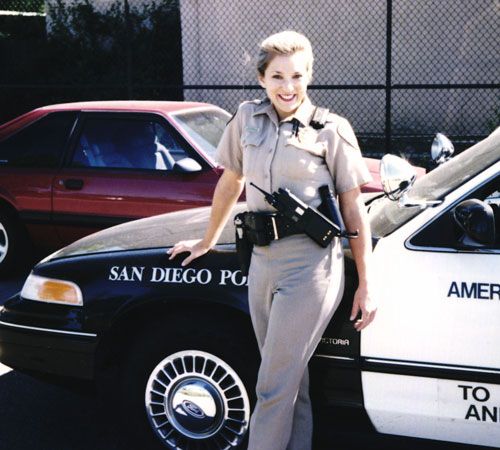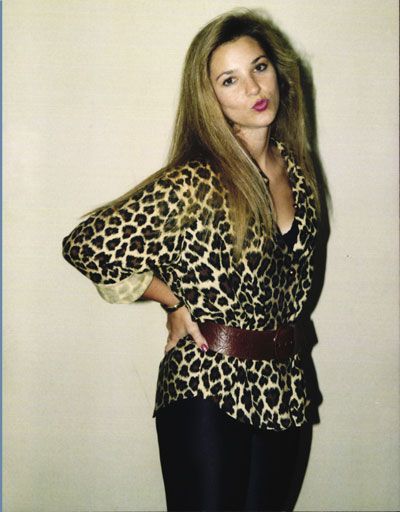Today Diane Halfman works with business owners on how to clear the clutter from their lives and create space to achieve their full potential. She calls it living the "Spa Life," because of the "ahhh" feeling you have when you make room in your life to offer your gift to the world. But, how she discovered the connection between clutter, chaos and success is a story that involves crime, prostitution and a career in uniform. Sounds crazy right? Watch the video and see for yourself.
Watch the video to see the entire interview with Diane or click here to listen to the podcast.
Highlights from My eWN Podcast Network Interview with Diane Halfman
PHYLLIS: This first segment, I want to talk to you about you and from whence you came, which is going to be hard for some people to believe because, look at you! You’re this gorgeous creature, you have this business about living your “spa life” but you started a very different way. So tell us about your journey when you were in the law-enforcement field.
DIANE: Absolutely! Thanks for asking, Phyllis! It’s interesting because the work I do, I look behind the scenes and a lot of people don’t know that I was a San Diego cop for 10 years and I worked uniform patrol as well as undercover assignments in gangs, narcotics, and vice. So that gave me insight into a lot of people’s homes. Mostly when they weren’t invited and in times where they were at their worst, so I have literally been in thousands of homes and I was able to see what was going on with people and how people show up in the world, how we see each other and how we want to be our best - that behind closed doors, things may not be as pretty, and may not be the way that we want it to be. So, it was during that time that I actually coined the term called “clutter awareness” where it’s clutter to drama and it was the “clutter to drama ratio” which I came up with.
The more clutter that was in people’s space, the more drama they had in their life, the more the police had to come. So, there was that correlation that had come, and there is a correlation between what’s happening in your space and your environment and how happy you are, how effective you are and how it affects you in business. And the reverse is true too– When you reduce the clutter in your space, you can open up your mind and you can see things from a different perspective. No police have to be coming to your home, and I really saw there something here for me to step into.
PHYLLIS: It’s just hard to see, hard to imagine, that for ten years you were breaking down people’s doors arresting people, and seeing the worst of people, and how now you are helping people find the best of
themselves. I want to go back a little bit more, and give us some kinda juicy stories about when you were breaking into people's homes and, as a police officer, not as a criminal. First of all, how did you become a law enforcement officer? I mean, that’s not what your parents expected of you, am I correct?
DIANE: No. No.

I didn't want to be an Attorney, so I became a cop.
PHYLLIS: How’d you get there?
DIANE: Well you know, it’s interesting, I remember my dad saying when I was going to college, that I was the oldest of three and my dad- You know, my parents really wanted me to succeed and when I was going to choose a major in college, they were like “Okay, are you going to be a doctor or an attorney?” - like those were my only choices in the world kind of thing. So, I thought “Well I don’t want to be a doctor, but law sounds interesting.” So, I actually got my degree in criminal justice and I was going to be an attorney. And so, I started doing work in my senior year, doing shepherding of cases and I realized that this is not what I want to do with my life. Then I was like “Well, what do I with a criminal justice degree?” - and some of the guys who I was graduating with were going into law enforcement and invited me to go on some ride alongs and I thought “You know, I’ll check this out.” And so, I did and I thought “Well you know, it can’t hurt to put in my application and see what happens.” From the time I put in my application to the police academy, three months later, I was a police officer. I was in the academy, I was starting the process – I had never even held a gun before!
I was 12 years of Catholic school, it was totally out of my knowing and comfort zone and all that. At the same time, there was a serial killer that was going on, historically, and so I started doing undercover work as a prostitute because we were there to lure him in order to stop the mass killing of women because they were targeting prostitutes. So that’s why we were out there, to identify him. So that was a whole other world of prostitution. My own facade and my own journey of going from being a mother, and at the time I was a single mother and newly divorced, and I had to show up as this strong police officer in uniform. I had to be like I knew what I was doing in the street as a prostitute and just go home and be a mom. And just all those roles, on one day on a daily basis. I mean I was living at the epitome, if you will, showing up one way but having all of these things happening behind the scenes for myself as well. Especially as a single mom and how I was going to make my mortgage payment, of all things. You know, there were just a lot of things going on for myself and not being that sure that you can do what you set off to do.

PHYLLIS: Well– And as a single mother– What you just described is a dangerous life. I mean, you’re living as a prostitute! There are just so many images that are coming in my head right now – That jaw-dropping story that I mentioned in my introduction, that these are the kind of stories I’m talking about. You gotta take us there. You gotta take us to when you were walking the streets and what was that like for you? I mean, can you give us one juicy story? How did you do that - convince these men to go with you but then you don’t follow through! How does that happen?
DIANE: Well you know, it’s so funny. I mean a lot of people have, like, a lot of misconceptions around prostitution, and why law enforcement would actually be involved with that, because… You know, frankly we don’t care who’s sleeping with who. The part of it is really what we find out. Information. Because people that are around prostitution are connected to crime. You know, people who are just getting out of jail pretend to connect with the prostitutes. It allows us, for when we arrest them, to pinpoint a time and place for them, so when crime happens in the area, it really helps us solve cases and really connect things that are happening. So it attracts a whole different element. I mean, there is such a gamut of things that happen when you’re on the street. I can remember one of the times – The scary part is that here I am dressed up as a prostitute. I can’t have my gun on me, I can’t have my radio, I don’t have any type of weapon on me and I have to rely on my detectives who are watching me to make sure that they’re protecting me. And I’m relying on other people for my safety. So, you know, that’s a whole other aspect, but I remember one of the times I was standing on the corner, and it was almost like a movie set. I had this big Cadillac come around the corner and these two guys in hats and suits come out, and they start kind of, you know, harassing me, asking me like “What are you doing around here?” They were the pimps that owned the corner, and they were getting ready to drag me into the car, and we had to not blow my cover. So one of the detectives had actually stepped out and pretended he was my pimp, and we had this whole discussion like “I’m sorry I’m on the street.” And just this whole acting that had to happen - Between the detective who was playing my pimp and the actual pimps, we just had to try to settle the scene to make them go away. So, it’s just that type of craziness was happening. And then just the interaction with the guys who are actually soliciting me, which we’d call them Johns. There was one night where our whole goal is to arrest as many people as possible that night so we can identify them. So, there was a night that I actually arrested thirty-four men that night. But one of the things that happened was I was standing on the corner and a guy was driving by in his car, and you know that rubbernecking where you’re just looking at someone too long? Well, he was looking at me instead of on the road, and so he crashed into a center divide in front of me. And the wheel of his car actually came off and was rolling down the street. So, he hobbles his car over to the side of the road, and what’s crazy about it was that he actually got out of his car, came over and still solicited me! Even though he’d crashed the car! After I had arrested him, and I was interviewing him and having a conversation, I just said “Wasn’t it a sign to you? What possessed you, when you actually crashed your car, to come over and still solicit me?” and he said, “Well I figured I had to wait for a tow truck anyway so I had time.”
PHYLLIS: Oh, my goodness! Wow. I don’t even know what to say to that. It’s just unbelievable. It’s like, the fact that you did it and were willing to do it and excited to do it and arrested all the men. I mean, that kind of drive! I’m sure you bring that into your business today, no question.
DIANE: Absolutely.
PHYLLIS: You alluded to earlier in our interview how it was through this detective work that you became aware of the link between clutter and crime. Take us from: You decided to leave law enforcement and start your business. Is that the journey that you took? Or is there some kind of transition in between, because that’s a pretty big leap.
DIANE: You know, it is a leap. Crime sometimes came into play with that, but what I found is that it was the link that I found was between clutter and drama. Sometimes crime was involved in that, but drama was just your life wasn’t working. You know, the fact that you had to have police come into your home, whether it was domestic violence, or you had break-ins, or it was drug use there was the drama that was associated with their life. So, it was the clutter to drama ratio that was happening. Because your environment affects everything. It either pulls you towards your goals and the things you want to do or it actually, you know, repels you and keeps you away. So, it’s really important to really look at your environment.
So that was the thing I was able to see in literally in thousands of homes, to see that your environment affected everything. And it didn’t have a lot to do with socioeconomic, whether you had a lot of money or whether you didn’t have a lot of money. It was what was happening in your home. What kind of systems and structures, what kind of space was actually supporting you to live a productive life. And the people that had a lot of things happening in their space weren’t supporting them in their lives. I started making these connections and really helping people, in their space, to clear out the clutter, to really clear the things that were happening in their space and as I was retiring out of the department, I was being asked to help people create the environment that allowed them to be successful.
There were two things I was stepping into from a business perspective - was looking at people’s environment and seeing what was not supporting them, because environment affects everything. And so, I was looking at most entrepreneurs and people who were in business - they needed to have clarity in their space. They needed to have a space that supported them, so then I also coined the term, “that creativity-” because we all need creativity and bandwidth to do the things we do, so the “creativity craves clarity.” So, we really need to clear the space so people can be creative so they can step into and do the big work that they’re here to do. But if they’re distracted, and I can already hear people saying, “Well the piles don’t bother me,” “It’s not affecting my work,” “I’m a creative person.” I mean, all these types of things. However, subconsciously, our brain gets distracted into other things, and I would even venture as much to say that the lack of focus that people are having these days, I believe, is directly related to their environment and not creating an environment that really supports them. And I’m not saying that it has to be a sterile environment and you have to clear everything. You want to have those chosen few things that inspire you, and you are able to utilize to really do your work in the world.
Transcription services provided by our eWomenNetwork member, The Sweet Support Company









